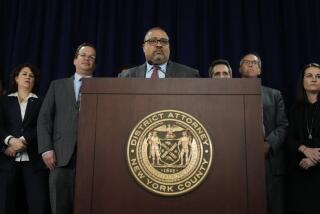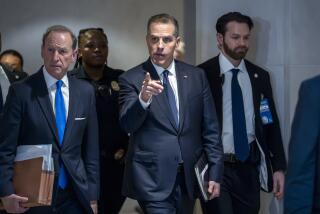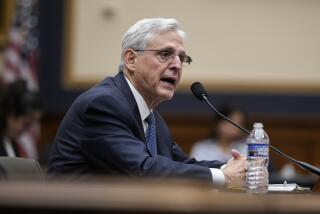Opinion: It’s not William Barr’s job to second-guess how Congress responds to the Mueller report
- Share via
Atty. Gen. William Barr is scheduled to testify on Capitol Hill this week, but at least one appearance — before the House Judiciary Committee — is now in doubt. Barr is apparently objecting to committee Chairman Jerrold Nadler’s plan to assign some of the questioning at Thursday’s hearing to staff attorneys.
“The attorney general agreed to appear before Congress,” Justice Department spokeswoman Kerri Kupec told the New York Times. “Therefore, members of Congress should be the ones doing the questioning.” She added that Barr “remains happy to engage with members” on their questions about special counsel Robert S. Mueller III’s report.
Given the tendency of members of Congress to waste their question time with self-absorbed speechifying, one might think Barr would welcome the alternative of sustained questioning by a fellow lawyer who isn’t campaigning for reelection.
Or maybe not. If Barr wants to evade questions, a politicians-only murder board would be preferable to a skilled interrogation by an attorney. And there are questions that Barr might find uncomfortable.
One is whether Barr’s summary of Mueller’s “principal conclusions,” released more than three weeks before a redacted version of the report was made public, was misleading. (This compare-and-contrast article by Charlie Savage of the New York Times offers a good departure point.)
Another question: On what basis did Barr and Deputy Atty. Gen. Rod Rosenstein conclude that the evidence gathered by Mueller “is not sufficient to establish that the president committed an obstruction-of-justice offense”? Barr and Rosenstein addressed that question after Mueller declined to make a definitive finding on obstruction.
Nadler is smart to turn to committee lawyers to pose those questions and others and presumably to follow up if Barr proves unresponsive. And, despite what the Justice Department suggested, it’s not that unusual for lawyers to join in questioning witnesses before congressional committees.
Flash back to the Senate Watergate Committee hearings in July 1973. It was Fred Thompson, a Republican committee lawyer, who elicited from a White House aide, Alexander Butterfield, the fact that President Richard M. Nixon had secretly tape-recorded conversations in the Oval Office. That revelation, of course, eventually led to disclosure of the “smoking gun” recording that forced Nixon to resign to avoid impeachment.
Thompson’s Democratic counterpart, chief counsel Samuel Dash, also questioned witnesses during the hearings.
More than a decade later, the pattern was repeated when John W. Nields Jr., the House counsel in the Iran-Contra hearings, interrogated Marine Lt. Col. (and future National Rifle Assn. President) Oliver North and Atty. Gen. Ed Meese. Arthur Liman, the counsel for the Senate, also posed painstakingly prepared questions.
More recently, Republicans on the Senate Judiciary Committee decided to ask Rachel Mitchell, a sex crimes prosecutor, to question Christine Blasey Ford, who had accused Supreme Court nominee Brett M. Kavanaugh of assaulting her when they were teenagers.
Congressional committees should be free to decide that employing skilled lawyers to question witnesses will result in more information. Barr should stop quibbling, show up as scheduled and answer questions put to him — regardless of who asks them.
Enter the Fray: First takes on the news of the minute »
Follow the Opinion section on Twitter @latimesopinion and Facebook
More to Read
A cure for the common opinion
Get thought-provoking perspectives with our weekly newsletter.
You may occasionally receive promotional content from the Los Angeles Times.










